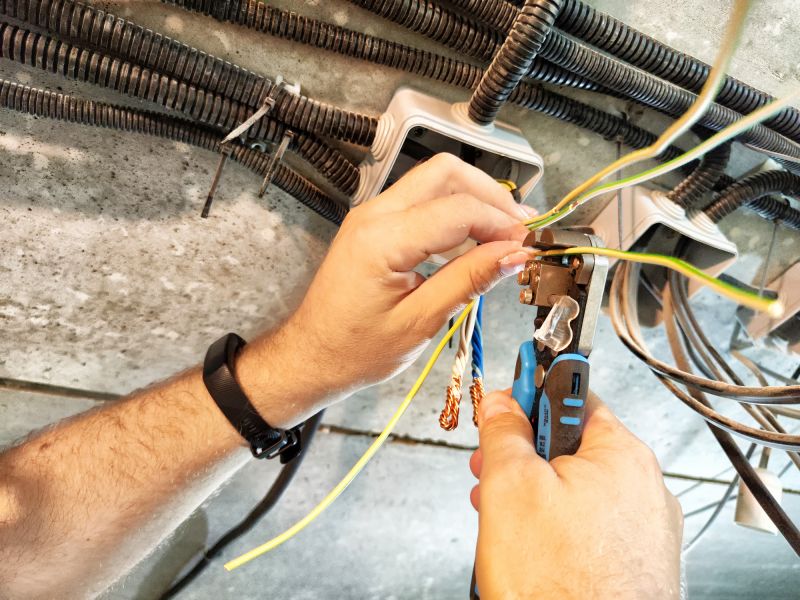Expert Picks for Residential Electrical Inspection Equipment
Find out which high-performing products are favored by professionals for inspecting residential electrical systems effectively.
 Residential electrical inspectors rely on a variety of specialized tools and equipment to ensure electrical systems meet safety standards and code requirements. These products range from handheld testers to advanced diagnostic devices, each serving a specific purpose in the inspection process. Proper selection of these tools can enhance accuracy, efficiency, and safety during inspections. It is important for inspectors to choose durable, reliable, and easy-to-use equipment that can withstand frequent use in different environments.
Residential electrical inspectors rely on a variety of specialized tools and equipment to ensure electrical systems meet safety standards and code requirements. These products range from handheld testers to advanced diagnostic devices, each serving a specific purpose in the inspection process. Proper selection of these tools can enhance accuracy, efficiency, and safety during inspections. It is important for inspectors to choose durable, reliable, and easy-to-use equipment that can withstand frequent use in different environments.
Top Overall Option
Multifunction Electrical Testing Kit
A comprehensive testing kit that combines multiple essential tools such as a digital multimeter, circuit tester, insulation resistance tester, and non-contact voltage detector. Designed for durability and ease of use, it provides residential electrical inspectors with a versatile solution to perform various diagnostic tasks efficiently. Its all-in-one nature helps streamline inspection workflows and ensures reliable readings across different scenarios.
Types of Products For Residential Electrical Inspectors
Digital Multimeters
Devices used to measure voltage, current, and resistance, essential for diagnosing electrical issues.
Non-Contact Voltage Detectors
Tools that detect the presence of voltage without direct contact, useful for quick safety checks.
Insulation Resistance Testers
Instruments that assess the quality of insulation in wiring and cables to prevent faults.
Circuit Testers
Handheld devices for verifying wiring connections and circuit continuity.
Clamp Meters
Tools that measure current flow without disconnecting circuits, ideal for live testing.
Thermal Imaging Cameras
Devices that detect heat patterns to identify electrical hotspots and potential failures.
Outlet and Receptacle Testers
Small devices that quickly verify wiring correctness in outlets and switches.
Circuit Mapping Devices
Tools that help visualize and document electrical circuits for better inspection management.
Portable Power Supplies
Battery-powered units that provide reliable power to inspection tools in the field.
Extension Cords and Power Strips
Flexible cords and strips to extend reach and power multiple devices on-site.
Labeling Tools
Markers and tags for organizing wiring and circuit identification.
Voltage Testers with Audible Alerts
Devices that provide audio signals indicating voltage presence, enhancing safety.
Ground Resistance Testers
Tools to measure grounding system effectiveness and safety compliance.
Socket and Outlet Analyzers
Instruments that evaluate the wiring and functionality of electrical outlets.
Portable Oscilloscopes
Advanced devices for detailed analysis of electrical signals and waveforms.
Popular Choices
Widely used for measuring electrical parameters across various inspection scenarios.
Commonly employed for quick safety checks before handling electrical components.
Popular for assessing wiring integrity and ensuring insulation quality.
Frequently used for verifying circuit connections and troubleshooting wiring issues.
Valuable for measuring current without interrupting circuits, especially in live environments.
Increasingly adopted for identifying hot spots and potential electrical faults.
Common tools for quick verification of outlet wiring correctness.
Useful for documenting complex wiring layouts during inspections.
Popular for ensuring continuous power to tools in the field.
Essential for extending reach and powering multiple devices during inspections.
Helpful for organizing wiring and circuit identification tasks.
Preferred for safety, providing instant audio signals when voltage is detected.
Important for verifying grounding system safety and compliance.
Popular for quickly diagnosing wiring issues in outlets and switches.
Getting more attention for detailed electrical signal analysis in complex inspections.
Inspection tools often include circuit testers, which allow for quick verification of wiring and voltage presence. Multimeters are essential for measuring electrical parameters such as voltage, current, and resistance, providing detailed insights into system performance. Insulation testers help evaluate the integrity of wiring insulation, while socket testers assist in identifying wiring issues within outlets. Additionally, clamp meters enable non-intrusive current measurements, making them invaluable for troubleshooting live circuits.
Beyond handheld devices, inspectors also utilize specialized equipment such as thermal imaging cameras to detect hot spots and potential electrical failures. Labeling tools and circuit mapping devices facilitate organized inspections and documentation. Portable power supplies and extension cords ensure that inspectors can operate their tools effectively on-site, even in hard-to-reach areas. The selection of these products should consider compatibility with existing equipment, ease of calibration, and ergonomic design to reduce fatigue during extended inspections.
Investing in high-quality, versatile products can help inspectors perform thorough and accurate assessments, ultimately contributing to safer residential electrical systems. As technology advances, newer tools with enhanced features continue to emerge, offering inspectors more detailed diagnostics and streamlined workflows. Staying informed about the latest equipment options can lead to more effective inspections and better compliance with electrical codes.
Key Buying Considerations
- Compatibility with existing tools and systems
- Ease of calibration and maintenance
- Durability and build quality for frequent field use
- Ease of use and ergonomic design
- Range of measurement capabilities
- Battery life and power source options
- Size and portability for on-site inspections
- Accuracy and reliability of readings
- Safety features such as insulation and protective casing
- Availability of replacement parts and accessories
- Compatibility with digital record-keeping or app integration
- Manufacturer reputation and customer support
- Warranty and return policies
- Cost and value for the features offered
- User reviews and feedback on real-world performance
